WHEELS OF INDUSTRY.
Page 4
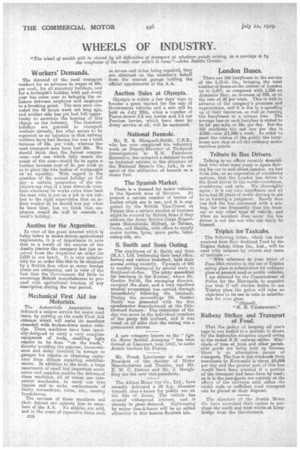
Page 5
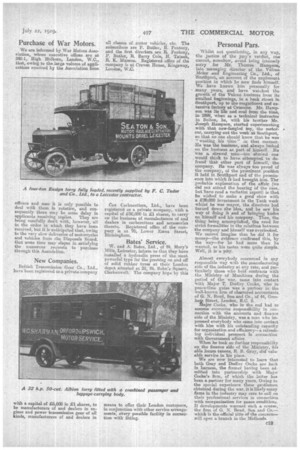
Page 6
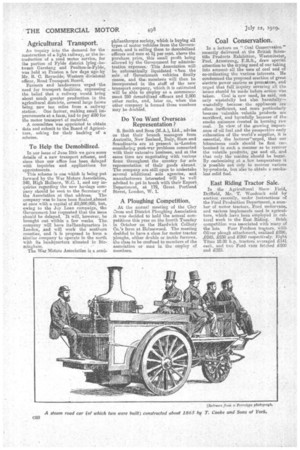
Page 7
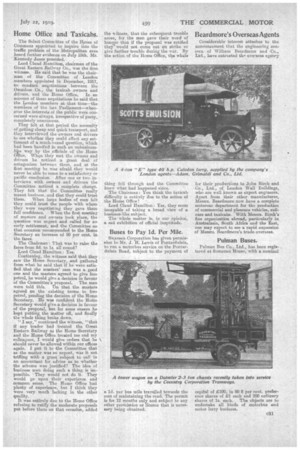
Page 8
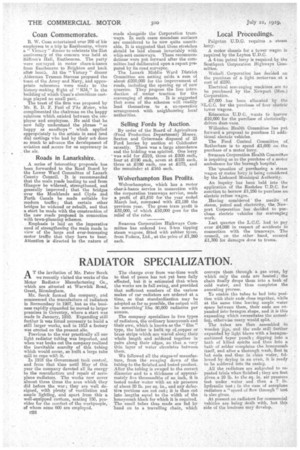
If you've noticed an error in this article please click here to report it so we can fix it.
'The wheel of wealth will be slowed by all difficulties of transport at whatever points arising, as a carriage is by the roughness of the roads over which it runs."—John Beattie Groeier,
Workers' Demands.
The demand of the road transport workers for an advance in wages of 10s. per week, for all statutory holidays, and for a fortnight's holiday with pay every year has come near to bringing the -relations between employer and employee to a breaking point. The men were conceded the 48 hours -week not long ago, and neither side has yet had full opportunity to ascertain the bearing of this charge on the industry. The statutory holidays are granted to transport workers already, but what seems to be regarded as an injustice is that railway workers have had during the war a toted increase of 33s. per week, whereas the road transport men have had zos. We should think that the fairest compromise—and one which fully meets the needs' of the case—would be to agree a further increase now of 3s. per weak so as to place the two bodies of workpeople on an equality. With regard to the question of the annual holiday on fell pay a certain proportion of the employers-say that if a man demands overtime whenever he works extra time (and the man who is out on a job is not subject to the rigid supervision that an indeor worker is) he should lose pay when he loses time, hut we think that employers would do well to concede a week's holiday.
Austins for the Argentine..
In view of the great interest which is being taken in motor-driven agricultural implements, in is of importance to note that as a result of the success of the Austin tractor the company has just received from the Argentine an order for. 3,000 in one batch. It is very satisfactory for an order like this to be obtained by a British firm when so many foreign rivals are competing, and in view of the fact that the Government did little to enure-rage British manirfacturers to proceed with agricultural tractors of any description during the war period.
Mechanical First Aid for Motorists.
The Automobile Association has initiated a unique Service for motor road users, by putting on the roads First Aid sidecare which will assist its members stranded with broken-down motor vehicles. These machines have been specially-designed to carry a very complete equipment of tools, enabling light repairs to be done "on the roads, ' thereby avoiding the expense, inconvenience and delay involved in towage to garages for repairs ox obtaining assistance from distant repairing establishrunts. In addition to the tools, a large assortment of small but important accessories and supplies enables the driversof these machines; all of whom are competent mechanics, to carry out tyre repairs and to make replacements of faulty connections, wires, etc., causing breakdowns.
The eervices of these machines and their drivers are entirely free to members of the A. A. No articles are sold, and in the event of expensive items such C18 as covers and tubes being repaired, they are obtained on the member's behalf from the nearest garage . holding the official appointment of the A.A.
Auction Sales at Olympia.
Olympia is within a few days' time to become a great market for the sale of Government vehicles and a sale will be held on July 29-th, when a• number of Pierce-Arrow 3-5 ton lorries and 3-5 ton Peerless lorries, which have done no Army eerviee at all, will be auctioned.
National Benzoic.
Mr. E. S. Shrapnell-Smith, C.B.E., who has now completed his voluntary work as Deputy-Director of Technical Investigations in Bat. Petroleum Executive, has accepted a retainer to act as technical adviser to the directors of the National Benzoic. Co., Ltd., in respect of the utilization of beneole as a motor fuel.
The Spanish Market.
There is a demand for motor vehicles in the Spanish zone of Morocco. At present a certain number of lorries of Italian origin are in use, and it is suggested by the British Vtice-Consul at Tetuan that a certain amount of business mightlie secured by British firms if they address the Army Service Corp's Department (Intendencia Militar), at Tetuan, Ceuta, and Melilla, with offers to supply motor lorries, tyres, spare .parts, lubri
cating oils, etc. •
S. Smith and Sons Outing.
The employees of S. Smith and Sons (M.A.), Ltd. (emliracieg their head office, factory and various branches), held their annual outing recently. Upwards of 600 in number journeyed by special train to Southend-ort-Sea. The party assembled for luncheon in the Knrsaal, where Mr. Gordon Smith, the managing director, occupied tte chair, and a very excellent inimical prograMTIE was carried through imiieediately folleeiring. the luncheon. During the proceedings' Mr. Gordon Smith was presented with the first -speedometer manufactured at the Cric, kleimed factory.. The remainder of the clay was spent as the individual member-s of the party felt inclined, and it was voted on all sides that.the outing was, a pronounced success.
A new company known as the tin MotorMotor Societe: Ancinyme " has, been formed at Liancourt, near Ceeil, to make Austin tractors for France.
Mt. Frank Lanchester isthe new President of the _Society of -Motor Manufacturers and. Traders, axed Mr. E. M. C. Instone and Mr. J. Maughfling are the new vice-presidents.
The Albion Motor Car Co., Ltd., have recently delivered a 20 h.p. 15-seater torpedo char-Shance for public use on the Isle of Arran. The vehicle has created widespread interest, and is already in Treat demand. Sight-Seeingby motor char-h-bancs will be an added attraction in this famous Scottish isle.
London Buses.
There are 168 lorrybusee in the service of the L.G.O. Co., bringing the total number of buses on the streets of London up to 2,467, as compared with 1,753 on Armistice Day, an increase of 709, or at the rate of 20 per week_ This is well in advance of the company's promises and expectations, and it is due to a speeding up of their resources, as well as running the lorrybeists at a serious loss. The average loss on each lorrybus is stated to be Scl. per mile, or 30e, per day. FM' the 168 machines the net loss per day ;a £252—over £1,500 a week. In order to. Meet the wishes of the public the lorrybusee now stop at all the medicaremeter omnibus points.
Tribute to Bus Drivers.
Talking loan officer recently slemobilized wha after some years is again driving his car in and about London, we had from him, as an expression Of eonsideeed °pinion, that the London bus driver is the finest driver•in the worleleourteouz, considerate and safe. We thoroughly agree : it -is our own iinprgssion and, we have had 20 years of motor driving to aid us in forming a judgment. Rarely does one find the bus concerned with a, mishap, far less frequently than the tramcar or any other type of vehicle, and when an accident does occur the bus driver is not the one who can fairly be blamed.
Triplex for Taxicabs.
The following letter, which has been received from New Scotland Yard by the Triplex Safety Glass Coe, Ltd., will be read with interest by owners and users. of taxicabs:—
"With reference to your letter of June 24th relative to the use of Triplex safety glass in substitution for ordinary glass at present used on public vehicles, I am directed by the Commissioner of Police for the Metropolis to acquaint you that if eah ciwriers desire to use Triplex glass the police will raise no objection to its use in cabs in substitution for wire glass.
" (Signed), "G. B. IlienenwOon."
Railway Strikes and Transport
of Food.. .
That the policy of .keeping all one7s eggs in one basket is ,a mistake is shown by the deplorable situation caused owing to. -the recent N:E; ra.itivay sti•ike. Hundreds of tone of fruit and other perishable goods are 'being held -op because there is no alternative means of transport. The loss tothe iv.helesals fruit Merchants in Newcastle is about £5,00(1 per day and the greeter part of this loss would have been avoided if a portion of the transpect had been done by road; LLB it is the mereilants are entirely at the netrey of the railways until either the strike ends or sufficient road transport
can be placed at their diepozal. •
The directors of the Austin Motor Co. have exercieed their option to pur. -these the north and west-Works at Longbridge from the Government.
Purchase of War Motors.
We are informed by War Motors Association, whose executive offices are at 240-1, High HoIbotn, London, W.C., that, owing to the large volume of applications received by the Association from
officers and men it is only possible to deal with them in rotation, and consequently there may be some delay in applicants receiving replies. They are being carefully dealt with, however, all in the order in which they have been received, but it is anticipated that, owing to the very stow deliveries of motorcycles and vehicles from the Disposals Board; that some time may elapse in satisfying the numerous requests to purchase through this Association.
New Companies.
British Transmission Gear Co., Ltd., have been registered as a private company with a capital of 25,000 in 21 shares, to be manufacturers of and dealers in engiues and power transmission gear of all kinds, manufacturers of and dealers in
all classes of motor vehicles, etc. The sulascribers are P. Butler, R. Pentony, and the first directors are R. Pentony, P. Butler, R. Barry Cole, H. Tainsh, R. K. Manson. Registered office of the company is at Craven House, Kingsway, London, W.C.
Cox Carburetters, Ltd., have been registered as a private company, with a capital of 250,000 in 21 shares, to carry on the business of manufacturers of and dealers in carburetters and accessories thereto. Registered office of the company is at 70, Lower Essex Street, Birmingham.
Bates' Service. W. and A. Bates, Ltd., of St. Mary's Mills, Leicester, inform us that they have installed a hydraulic press of the most -powerful type for the pres'sing on and off of solid rubber ta-res at their London depot situated at 28, St. fi-ohn's Square, Clerkenwell. The company hope by this
means to offer their London customers, in conjunction with other service arrangements, eery poesible facility in connection with fitting.
Personal Pars.
Whilst nut questioning, in any way., the justice of the jury's verdict, one cannot, somehow, avoid being intensely sorry for Mr. Thomas liampson, late managing director of the Vulcan Motor and Engineering Co., Ltd., of Southport, on account of the unpleasant position in which he now finds himself. We have known him personally for many years, and have watched the growth of the Wean business from its smallest beginnings, in a back street in. Southport, up to the magnificent and extensive factory at Crossens. Mr. Ramp. son was its life and soul from the time, in 1898, when as a technical instructor in Bolton; he, with his brother Mr. Joseph Harapson, started experimenting with that new-fangled toy, the motorcar, carrying out the work at Southport, so that no one should know that. he was "wasting his time" in that manner. He -was the business, and always looked on the business as part of himself. He was a, shrewd man—too shrewd one would think to have attempted to defraud that other part of himself, the company. He was always too proud of the company, of the prominent position it held in Southport and of the prominence into which it-had brought him. The .probable explanation of the affair (we did not attend the hearing of the case, but have, read a verbatim report) is that he wished to make a good show with a 220,000 investment in the Tank week whilst he was mayor, the directors had turned down the idea, and he saw his way of doing it and of bringing kudos on himself and his company. Then, the thing being accomplished, the need for strict formalities in the relations between the company and himself watt overlooked. We cannot imagine that he did it for money—the evidence confirmed this, by the way—far he had more than he wanted, as his tastes were quite simple. Well, it is a pity.
Almost everybody concerned in any responsible way with the manufacturing side of the industry at any rate, and partienlaaly those who held contracts with the Ministry of Munitions during the period of the war, came into contact with Major T. Dudley Cocke, Who in peace-time guise was a partner in the well-known firm of chartered accountants of G. N. Read, Sou and Co., of 44, Gresham Street, London, E.G. 2. Major Cooke, who in the end had to assume enormous responsibility in connection with the accounts and finance side of the Ministry:was a man who impressed everybody who came into contact with him with his outstanding capacity for organization and efficiency—a refreshing individual prospect in ,connection with Government affairs. When he took an further responsibility on the finance side of the Ministry, his able locum tenens, R. B. Gray, did valuabTh service in his place. We are now interested to learn that both Gray and Dudley Cooke are back in harness, the former having been admitted into partnership with Major Cocke'a firm, of which the latter has been a partner for many years. Owing to the special experience these gentlemen obtained dining the war, it is likely many
firms in the industry may care to call on their professional services in connection
-with reorganization for peace conditions. If developments warrant such a course, the firm of G. N. Read, Son and Co.-which is the official title of the concern— will open a branch in the Midlands.
Agricultural Transport.
An inquiry into the demand_ for the :tonstruction of a light railway, or the introduction of a road motor service, for the portion of Fylde district lying -between Garstang and Poulton-le-Fylde, was held at Preston a few days ago by Mr: R. C. Reynolds Western divisional officer, Road Transport.Board. Farmers and landowners urged the need for transport facilities, expressing the belief that a railway, would bring about much greater production in the agricultural districts, several large farms being now ten miles from a railway station. One farmer, making small improvements at a farm, had to pay £50-for the motor transport of material. A committee was appointed to obtain data and submit to the Board of Agriculture, asking for their backing of a scheme.
• To Help the Demobilized.
In 'our issue of June 10th we gave some details of a new transport sdheme, and since then our office has been deluged with inquiries and applications for appointments.
This soheme is one which is being put, forward by the War Motors Association, 240, High Holborn W.C. 1, and any Mquiries regarding the DOW haulage company should be seat to the Secretary of the Association at that address. The company was to have been fioated.almost at once with a capital of £2,000,000, but, owing to the Jay Loan campaign, the Government has requested that the issue should be delayed. It will, however, be brought out within a few weeks. The company will have itsaeadquarters in London, and will work the southern counties, and it is proposed to form a. Similar company to operate in the north with its headqnarters situated in Birmingham.
The War Motors Association it a semi philanthropic society, which is buying all types of motor vehicles from theGovernmeat, and is selling them to demobilized officers and men at 2i per cent, above the purchase price, this small profit being allowed by the Government for administration expenses.. This Association will be automatically liquidated u hen, the sale of Government vehicles finally ceases, and themembers will then be incorporated in the staff of the new transport company, whith_it is estimated will be able to employ as a commencement 250 demobilized officers and 2,000 other ranks, and, later On, when the other company is formed these numbers may be doubled.
Do You Want Overseas Representation ?
S. Smith and Sons (M.A.), Ltd., advise us that their branch managers from Australia, New Zealand, Italy, Siam and Scandinavia are at present in ,,London considering post-war problems connected with their extensive business, and at the same time are negotiating with various firms throughout the country for sole representation of their goad's abroad. The company are still open to undertake several additional solo agencies, and manufacturers interested will be well advised to get in touch with their Export Department, at 179, Great Portland. Street, London, W. 1.
A Ploughing Competition..
At the annual meeting of the .01ay cross and District Ploughing Association it was decided to hold the annual competitions this year on the fourth Tuesday in October on the Hardwick Colliery Co.'s farm at Hohnewood. The meeting decided to have a class for motor tractor ploughs, either deuble or treble furrows, the class to be confined to members f the association or men in the employ of members.
Coal Conservation.
In a lecture on '! Goal Conservation" recently delivered at the British Scientific Products Exhibition, Westminster, Prof. Armstrong, F.R.S. drew special attention to the crying need of our taking into amount all the uses of coal and of. co-ordinating the various interests. He condemned the proposed erection of great electric power centres as preniatuxe, and urged that full inquiry covering all the issues should be made before action was taken. Coal is now used, he said, not only wastefully but also harmfully— wastefully because, the appliances are often inefficient, and more particularly because valuable volatile products are sacrificed, and harmfully because of the
i smoke nuisance created n burning raw
coal. In -view of the growing 'importance of oil fuel and the prospective early exhaustion of the 'world's supplies, it is essential, the lecturer'urged, that our _bituminous coals should be first carbonized in such a manner as to recover the volatile products, gas and oil, and that only the residue should be burnt. By carbonizing at a low temperature it .is possible not only to recover various by-products, but also to obtain a smokeless solid fuel.
East Riding Tractor Sale.
In the Agricultural Show Field, Driffield, Mr. T. Woodcock sold by auction recently, under instructions of the Food Production Department, a awnber of motor tractors,. Ford inotorvans, and various implements used in agricul., tore, which have been employed in cultural work in the East Riding. Brisk competition was associated with many of
the lots. Four Fordson tractors, with Oliver plough attachment, realized £280, 4245, £230 and £260 respectively. Eight Titan 10-20 h.p. tractors averaged £141 each, and two Ford vans fetched £200 and £225.
Home Office and Taxicabs.
The Select Committee of the IIpuse of Commons appointed to inquire into the traffic problem of the Metropolitan area heard further evidence on July 15th. Mr. Kennedy Jones presided.
Lord Claud Elamiltoar, chairman of the Great Eastern Railway Co., was the first witness. He said that-he was the chair'man of the Committee of London
• members appointed in December, 1917, to conduct negotiations between the Ominbos Co., the taxicab owners and drivers, and the Home Office. In an account of these negotiations he said that the London members at that time—the members of the last Parliament---whenever the interests of the public were concerned were always, irrespective of party, completely unanimous.
• They felt at that period the necessity of getting cheap and quick transport, and they interviewed the owners and drivers to see whether they could effect any settlement of a much-vexed question, which had been handled in such an nnbusinesslike way by the officials of the Home Office. Whyn they met the owners and drivers he noticed a great deal of antagonism between them, and at the first meeting he was afraid they would never be able to come to a satisfactory or pacific conclusion. After one or two interviews with owners awl drivers the Committee noticed a complete change. They felt that the Committee really meant busines.s, and that they could trust them. When large bodies of men felt they could trust the people with whom they were negotiating they gave theni full confidence. When the first meeting of masters and owners took place, the question was m gent and called for an early settlement, and the Committee on that occasion recommended to the Home Secretary an increase of 50 per cent. inthe fares.
The Chairman : That was to raise the fares from 8d. to is. all round?
Lord Claud Hamilton: Yes.
Continuing, the witness said that they saw the Home Secretary, and gathered from what, he said that if he were satisfied that the masters' case was a good one and the masters agreed to give free petrol, he would give a decision in favour of the Committee's proposal. The men -were told this. 'On that the masters agreed on the existing terms to free petrol, pending the decision of the Home Secretary. He was confident the Home Secretary would give a decision in favour of the proposal, but for some reason he kept putting the matter off, and finally the whole thing broke down.
"I say," continued the witness, " that if any trader had treated the Great Eastern Railway as the Horne Secretary and the Home office treated me and my colleagues, I would give orders that he \ should never be allowed within our offices again. I put it to the Committee that as the matter was so urgent, was it not trifling with a great subject to call in an accountant for advice as to whether the scheme was justified? The idea of business men doing such a thine is impossible. They would not do it'. They would go upon their experience and common sense. The Home Office had plenty of experience, but I think they were very much lacking in the other quality.
It was entirely due lb the Home Office refusing to ratify the moderate proposals put before them on that occasion, added the witness, that the subsequent trouble arose, for the men gave their word of honour that if the proposal was ratified they'would not come out on strike or give further trouble during the war. By the action of the Home Office, the whole thing fell through and the Committee knew what had happened since. The Chairman: You think the taxicab difficulty is entirely due to the action of the Home Office? .
Lord Claud Hamilton : Yes, they seem incapable of taking a broad view of a business-like subject. The whole matter is, in our opinion, a sad exhibition of official ineptitude.
Buses to Pay id. Per Mile.
Sve,ansea Corporation has given permission to Mr. J. H. Lewis of Pontardulais, to run a motorbus service on the Pontardnlais Road, subject to the payment of a Id. per bus mile travelled towards the cost of maintaining the road. The permit is for 12 months only and subject to any other permission or licence that is necessary being obtaired.
Beardmore's Overseas Agents
Considerable interest attaches to the announcement that the engineering concern of William Beardmore and -Co., Ltd., have entrusted the ovoeseas agenc for their productions to John Birch and Co., Ltd., of London Wall Buildings, who are well known as export engineers. Apart from their other manufactures, Messrs. Beardmore now have a complete motorcar department for the production of commercial and pleasure vehicles, railcars and taxicabs. With Messrs. Birch's fine organization abroad, particularly in Australasia, South Africa and the East, one may expect to see a rapid expansion of Messrs. Beardmore's trade overseas.
Pulman Buses.
Pulman Bus Co., Ltd., has been registered at Somerset House, with a nominal capital of £100, in 80 8 per cent. preference shares of Ll each and 200 ordinary shares of is. each. The objects are to undertake all kinds of motorbus and motor lorry business.
Coan Commemorates.
R. W. Coen eutertained over 200 of his • employees to a trip to Eastbourne, where a " Victory " dinner to celebrate the 21st aenivereary of the concern was held at. Saffroe's Kali, Eastbourne. The party were coeveyed in motor chats-it-banes from EaeL.bourne to Brighton and back after lunch. At the "Victory " dinner Alderman Truman Stevens proposed the toast of the Army and Navy, "and appropriate references were made to the history-making flight of " R34," in the building ofwhich Coati's aluminium castings played no small part..
The toast of the firm was proposed by Mr. R. D. F. Paul of The Motor, who complimented the chairman on the happy relations whieh existed between the, employer and employees. He said that he now fully understood the phrase "as happy as sandboys " which applied appropriately to the artists in sand (and die) castings who had by their art done so much to advance the development of aviation and secure for us supremacy in the air.
Roads in Lanarkshire.
A series of interesting proposal has been forwarded to the Road Board by the Lower Ward Committee of Lanark County Council. It is recommended that the main roads leading to and from Glasgow be widened, strengthened, and generally improved ; that the bridges over the Monklands and Clyde and Fmth Canals be made suitable for modern traffic; that certain other bridges be widened or rebuilt, and that a start be made with the construction of -the new roads proposed in connection with town.planning schemes.
Emphasis is ia,id on the imperative need of strengthening the main roads in view of the levee and ever-increasing motor traffic that they have to bear. Attention is directed to the nature of
roads alongside the Corporation tramways. In such cases macadam surfaces are considered to be now quite uneuitable. It is suggested that these stretches should be laid almost invariably with whin-sett causeways. These recommene dations were put forward after the committee had deliberated upon a report prepared by ite road surveyor. The Lanark Middle Ward District Committee are setting aside a sum of about £200,000 for the improvement of roads, including the opening up of new quarries. They propose the free introduction of motor traction for the
scavenging of streets. It is suggested that some of the schemes will readily lend themselves to a co-operative arrangement with neighbouring local authorities. •
Selling Fords by Auction.
By order of the Board of Agriculture (Food Production Department) Messrs. Sexton and Grimwade disposed of 23 Ford lorries by auction at Colchester Decently. There was a large attendance and the bidding was spirited. One lorry was sold for £210, three at £200 each, four at £190 each, seven at £185 each, three at, 2180 each, one at £175, and the remainder at 2165 each.
Wolverhampton Bus Profits.
Wolverhampton, which has a motor ohar-A-bancs service in connection with the corporation tramways service, made a profit of 21,610 for the year ended March last, corepaited with £2,189 the previous year. The gross tram profit is £32,000, of which £10;000 gees for the relief of the rates.
Swaneea Corporation Highways Committee has ordered two 5-ton tipping steam wagons. fitted with subber tyres, from Fodens, Ltd., at the price of £1,260 each.
Local Proceedings.
Paignton U.D.C. requires a steam lorry.
A motor chassis for a tower wagon is required by the Leyton U.D.C.
A 4-ton petrol lorry is required by the Southport Corporation Highways Committee.
Walsall Corporation has decided on the purchase of a light motorvan at e cost of £250.
Electrical sea\ caging machines. are to be purchased by the Newport (Mon.) Corporation.
£7,000 has been allocated by tho :AL,C.C. for the purcheee of four electrie tower wagons.
Edmonton wants to borrow 210,000 for the purchase of electrically-. driven dust. vans.
Willesden Health Committee has put forward a. proposal to purchase 11 additional electric vehicles.
The Food Control Committee of Rotherham is to spend £1,000 OR the purchase of a motor lorry.
Swansea Corporation Health Committee is inquiring as to the purchase of a motor ambulance for the borough hospital.
The 'question of purchasing a steam wagon or motor lorry is being considered by the Liskeard Municipal Authority.
An inquiry has been held into the application of the Rushden U.D.C. for sanction to borrow £1,250 to purchase an electric refuse wagon.
_Having considered the merits of steam, petrol and electricity, the, Newport Corporation has decided to purchase electric vehicles for scavenging work.
Last quarter the L.C.C. had to pay over £4,000 in respect of accidents in connection with the tramways. The council, on the other hand, secured £1,300 for damages done to trams.






















